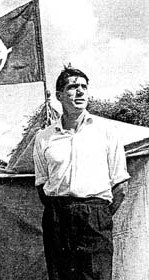
John Hutchyns Tyndall was a British fascist political activist. A leading member of various small neo-Nazi groups during the late 1950s and 1960s, he was chairman of the National Front (NF) from 1972 to 1974 and again from 1975 to 1980, and then chairman of the British National Party (BNP) from 1982 to 1999. He unsuccessfully stood for election to the House of Commons and European Parliament on several occasions.

The National Front (NF) is a far-right, fascist political party in the United Kingdom. It is currently led by Tony Martin. As a minor party, it has never had its representatives elected to the British or European Parliaments, although it gained a small number of local councillors through defections and it has had a few of its representatives elected to community councils. Founded in 1967, it reached the height of its electoral support during the mid-1970s, when it was briefly England's fourth-largest party in terms of vote share.

The British Movement (BM), later called the British National Socialist Movement (BNSM), is a British neo-Nazi organisation founded by Colin Jordan in 1968. It grew out of the National Socialist Movement (NSM), which was founded in 1962. Frequently on the margins of the British far-right, the BM has had a long and chequered history for its association with violence and extremism. It was founded as a political party but manifested itself more as a pressure and activist group. It has had spells of dormancy.
John Kingsley Read was a British fascist politician and Holocaust denier. He was chairman of the National Front (NF) from 1974 until 1976, when he founded the National Party.

The National Labour Party (NLP) was a British neo-Nazi political party founded in 1957 by John Bean. The party campaigned on a platform of white nationalism, anti-Semitism, and opposition to non-white immigration.
John Edward Bean was a British political activist and writer, who was a long-standing participant in far-right politics in the United Kingdom, and a number of its movements.

Andrew Fountaine was an activist involved in the British far right. After military service in a number of conflicts Fountaine joined the Conservative Party and was selected as a parliamentary candidate until his outspoken views resulted in his being disowned by the party.
The British Democratic Party (BDP) was a short-lived far-right political party in the United Kingdom. A breakaway group from the National Front, the BDP was severely damaged after it became involved in a gun-running sting and was absorbed by the British National Party.
The National Party of the United Kingdom (NP) was a short-lived splinter party from the British National Front (NF). It was formed on 6 January 1976, and was dissolved in 1984.
The Greater Britain Movement was a British far right political group formed by John Tyndall in 1964 after he split from Colin Jordan's National Socialist Movement. The name of the group was derived from The Greater Britain, a 1932 book by Oswald Mosley.
Martin Guy Alan Webster is a British neo-nazi, a former leading figure on the far-right in the United Kingdom. An early member of the National Labour Party, he was John Tyndall's closest ally, and followed him in joining the original British National Party, the National Socialist Movement and the Greater Britain Movement. Webster also spent time in prison for helping to organise a paramilitary organisation, Spearhead, and was convicted under the Public Order Act 1936. Rumours of his homosexuality led to him becoming vilified in far-right circles, and he quietly disappeared from the political scene.
The British National Party (BNP) was a neo-Nazi political party in the United Kingdom. It was led by John Bean. The group, which was subject to internal divisions during its brief history, established some areas of local support before helping to form the National Front in 1967. Scholar Nigel Fielding described the BNP as having a "firmly Nazi" ideology.
John O'Brien was a leading figure on the far right of British politics during the early 1970s.
The National Independence Party was a minor far-right party that appeared in British politics during the 1970s. The party was led by John Davis and campaigned on a platform similar to that of the much bigger National Front (NF) on anti-immigration, anti-European Economic Community, anti-communism themes.
Eddy Morrison was a British neo-Nazi political activist, who was involved in a number of movements throughout his career.
Denis Pirie is a veteran of the British far right scene who took a leading role in a number of movements.
Edward Budden was a British veteran of the far right who was well known in such circles for his satirical columns that appeared in a number of publications down the years.
The British National Party (BNP) is a far-right political party in the United Kingdom formed as a splinter group from the National Front by John Tyndall in 1982 and was led by Nick Griffin from September 1999 to July 2014. Its current chairman is Adam Walker. The BNP platform is centred on the advocacy of "firm but voluntary incentives for immigrants and their descendants to return home", as well as the repeal of anti-discrimination legislation. It restricted membership to "indigenous British" people until a 2010 legal challenge to its constitution.
The history of the National Front, a far-right political party in the United Kingdom, began in 1967, when it was founded by A. K. Chesterton.




